全国英语演讲比赛冠军演讲稿
全国英语演讲比赛一等奖_清华大学曹丰_英语演讲稿
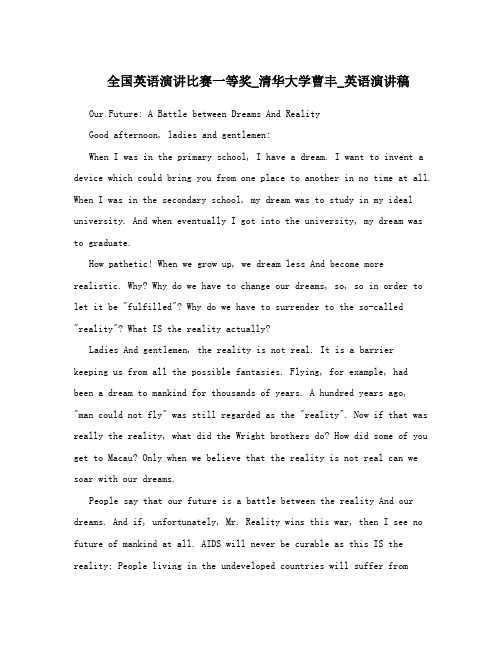
全国英语演讲比赛一等奖_清华大学曹丰_英语演讲稿Our Future: A Battle between Dreams And RealityGood afternoon, ladies and gentlemen:When I was in the primary school, I have a dream. I want to invent a device which could bring you from one place to another in no time at all. When I was in the secondary school, my dream was to study in my ideal university. And when eventually I got into the university, my dream was to graduate.How pathetic! When we grow up, we dream less And become morerealistic. Why? Why do we have to change our dreams, so, so in order to let it be "fulfilled"? Why do we have to surrender to the so-called "reality"? What IS the reality actually?Ladies And gentlemen, the reality is not real. It is a barrier keeping us from all the possible fantasies. Flying, for example, had been a dream to mankind for thousands of years. A hundred years ago, "man could not fly" was still regarded as the "reality". Now if that was really the reality, what did the Wright brothers do? How did some of you get to Macau? Only when we believe that the reality is not real can we soar with our dreams.People say that our future is a battle between the reality And our dreams. And if, unfortunately, Mr. Reality wins this war, then I see no future of mankind at all. AIDS will never be curable as this IS the reality; People living in the undeveloped countries will suffer fromstarvation forever as this IS the reality; 4)Disputes among different countries would never be settled as this misunderstandings And intolerance IS the reality.Ladies And gentlemen, how many of you have a dream of being able to make a lot of money? Please raise your hands. Oh, quite a number of you! Actually, ladies And gentlemen, this is not a dream, but a task. Every one of us has to make a living, right? Anyway I hope your task will be accomplished. How many of you think that you have already fulfilled your dream And that you don't dream anymore? Dear 5)adjudicators, what do you think? C.S. Lewis once said,"You are never too old to dream a new dream." So for our future, please dream And be unrealistic.Now that I am a university student, my goal is to graduate with excellences. But at the same time, I have a dream deeply rooted in our future. One day, people living in the areas now 6)sweltering with the horror of wars will be able to sit with their families And enjoy their every moment. One day, people from the rich countries are willing to share what they have with those from the poor countries And those from the poor countries will eventually be able to make their own happyliving themselves. One day, different cultures in this age of globalization will coexist with tolerance And the unfriendly confrontations among them will be 7)eliminated. One day, the globe will share the dream with me And we will all contribute to making our dream come true. One day, our dream will defeat the reality! Thank you very much.promote urbanization, and achieve the goal of promoting the city as a whole. Centre for functional specialization includes the nanxi area Convention and Exposition Center, old State cultural education center, old town culture tourism Center, Harbor capital goods trade center, Li Zhuang, cultural tourism centre, the Naxi culture and tourism Center. For主持人:Thank you.曹丰:Thank you.问题:Now in the age of the Internet,reading books does not seem as important as it once was.Do you think people can learn as much on the Internet as they can by reading books?Which method do you prefer?回答:Thank you very much.And hello again ladies andgentlemen.Actually,I don't really agree with the first sentence of this topic:"In the age of the Internet,reading books does not seem as important as it was once."Why?Why is it the case?Why is it the situation,ladies and gentlemen?Actually,Internet or books are just like tea or coffee.They are similar,but they are different.University students nowadays love to use the Internet to search for information when they are working with their essays.Like,last semester,when I was working with my physics essay,I logged into Google and I searched for "NEWTON" and all the laws and theories of Newton just popped out and I can choose whichever one I like to use.But when I walked into the library,all the books came out and I have to choose which one toread.How inconvenient!Maybe you can say at this moment,"Oh,Internet isbetter,books no use."So I have to use Internet,right?But let's see the things in another way.I love traveling a lot and I love to bring a book with me.And I love to read my Da Vinci Code when I was having my trip on a bus or on a ship.Actually,whenever it is,wherever you go,whatever you are doing,you can take out a book and read if you feel like doing so.Now who will bother to take a laptop and switch it on,and search for the Internet connection,and look for stories to read.How inconvenient!So at this very moment I think it's quite dangerous for me,because I think I'm unable to answer the question in the topic"Which method do youprefer,Internet or books?"because I love the feeling of conjuring a hundred pages of Harry Potter,more than scrolling down the screen;but at the same time I love the feeling of searching the things,the speed of my searching for things on the Internet,more than wasting my time in the library.So in this age of Internet,in this age of modernization,in this age of civilization,why do you have to force someone to choose between internet and books?I prefer using both of them.Thank you very much.问题:Contestant No.13.Thank you very much for encouraging us to be unrealisticdreamers(Thank you) and not surrender to Mr.Reality.(hehe..) Withthe traffic jam getting worse--especially in big cities--I'm actually very interested in your childhood dream:To invent a device that can move people around easily.Is this still your dream?If not,why do you give it up?Is it because it is considered unrealistic?Thank you.回答:Thank you very much.This is not my dream now.Not because it is (not), realistic.Maybe you can say it's unrealistic.But if I,my interest is still inventing this device,I will keep on trying my best to invent this decive.My changing of my dreams is because of the fact that I realized my interest does not lie in science.Now I am a law school student.But last semester,as I've just mentioned,I was working on my physics essay paper and actually last semester I was a student in the school of aerospace.Oh my god,aerospace!And I've changed my major to law school.And so promote urbanization, and achieve the goal of promoting the city as a whole. Centre for functional specialization includes the nanxi area Convention and Exposition Center, old State cultural education center, old town culture tourism Center, Harbor capital goods trade center, Li Zhuang, cultural tourism centre, the Naxi culture and tourism Center. Forthe changing of my dream is actually because of the fact that I realize my interest lies in,maybe communicating with others,or having interactions with the others.Science is very fantastic,but it's not my piece of cake.Yes,so that's the reason.Thank you very much.问题:Thank you very much for your speeches.Talding about Internet,I just want to know your view.Do you believe everything is ture on the Internet?If not,why not?回答:Thank you very much.I don't believe everything is true in the Internet.This is a straight forward answer.And if not,why not?Because I don't believe them.And I have an experience of meeting someone on theInternet who claims to be a girl.Yes and,a very sad,sorry story for me.But yes,for this reason,I think I don't believe that everything on the Internet is true.But I will try my best to discover if that was true or not,or that was falsified or not.Thank you very much.问题:Contestant No.13.Thank you very much for your speeches.You were talking about dreams being realistic or unrealistic and your current dream is to graduate from law school.But what is your realistic or unrealistic dream after that?What do you want to use your graduation in law for?回答:Thank you very much.Actually,my dream,as mentioned in the last part of my speech,is to share my feelings,share my dreams with the globe.And when all the people in this Earth have my dream,they will work hard for the social betterment,I believe in that.So after I've graduated from law school,I think I will try my best to persuade the others to,to accept my dream,and that is exactly why I am here.I am here trying to persuade you all,I think you all,after listening to myspeech,hopefully,you can try to understand my dream and that we are all a member of the global village,and we have to try our best to work hard for the social betterment of all.This is why I want tobe,saying,speaking something here,and that is my goal--or realistic or unrealistic dream after I've graduated.I think I will try my best to do what I've said before.Thank you very much. promote urbanization, and achieve the goal of promoting the city as a whole. Centre for functional specialization includes the nanxi area Convention and Exposition Center,old State cultural education center, old town culture tourism Center, Harbor capital goods trade center, Li Zhuang, cultural tourism centre, the Naxi culture and tourism Center. For。
英语演讲比赛获奖演讲稿精选范文(精选3篇)
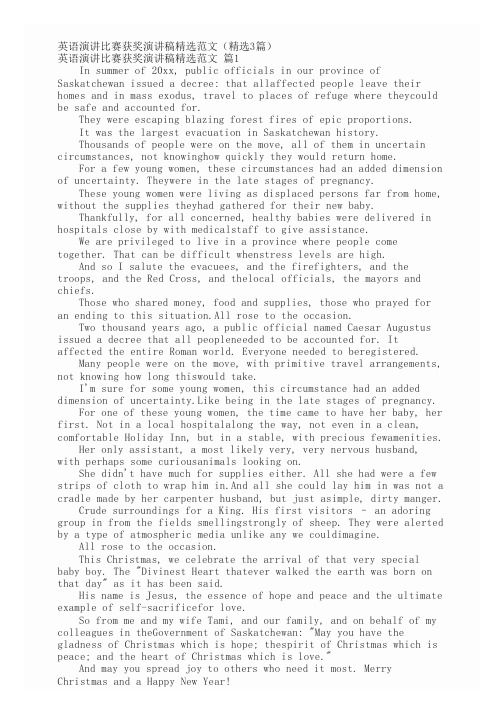
英语演讲比赛获奖演讲稿精选范文(精选3篇)英语演讲比赛获奖演讲稿精选范文 篇1 In summer of 20xx, public officials in our province of Saskatchewan issued a decree: that allaffected people leave their homes and in mass exodus, travel to places of refuge where theycould be safe and accounted for. They were escaping blazing forest fires of epic proportions. It was the largest evacuation in Saskatchewan history. Thousands of people were on the move, all of them in uncertain circumstances, not knowinghow quickly they would return home. For a few young women, these circumstances had an added dimension of uncertainty. Theywere in the late stages of pregnancy. These young women were living as displaced persons far from home, without the supplies theyhad gathered for their new baby. Thankfully, for all concerned, healthy babies were delivered in hospitals close by with medicalstaff to give assistance. We are privileged to live in a province where people come together. That can be difficult whenstress levels are high. And so I salute the evacuees, and the firefighters, and the troops, and the Red Cross, and thelocal officials, the mayors and chiefs. Those who shared money, food and supplies, those who prayed for an ending to this situation.All rose to the occasion. Two thousand years ago, a public official named Caesar Augustus issued a decree that all peopleneeded to be accounted for. Itaffected the entire Roman world. Everyone needed to beregistered. Many people were on the move, with primitive travel arrangements, not knowing how long thiswould take. I'm sure for some young women, this circumstance had an added dimension of uncertainty.Like being in the late stages of pregnancy. For one of these young women, the time came to have her baby, her first. Not in a local hospitalalong the way, not even in a clean, comfortable Holiday Inn, but in a stable, with precious fewamenities. Her only assistant, a most likely very, very nervous husband,with perhaps some curiousanimals looking on. She didn't have much for supplies either. All she had were a few strips of cloth to wrap him in.And all she could lay him in was not a cradle made by her carpenter husband, but just asimple, dirty manger. Crude surroundings for a King. His first visitors – an adoring group in from the fields smellingstrongly of sheep. They were alerted by a type of atmospheric media unlike any we couldimagine. All rose to the occasion. This Christmas, we celebrate the arrival of that very special baby boy. The "Divinest Heart thatever walked the earth was born on that day" as it has been said. His name is Jesus, the essence of hope and peace and the ultimate example of self-sacrificefor love. So from me and my wife Tami, and our family, and on behalf of my colleagues in theGovernment of Saskatchewan: "May you have the gladness of Christmas which is hope; thespirit of Christmas which is peace; and the heart of Christmas which is love." And may you spread joy to others who need it most. Merry Christmas and a Happy New Year!英语演讲比赛获奖演讲稿精选范文 篇2 还是在儿时,我的老师就在我的心中播下了一颗种子,一颗对“教师”这一职业期望的种子。
全国英语演讲比赛冠军演讲稿

全国英语演讲比赛冠军演讲稿Ladies and gentlemen,I am honored to stand here today as the champion of the National English Speech Competition. I would like to thank the judges for this incredible honor, and I would like to thank my family, my friends, and my teachers for their unwavering support throughout my journey.Today, I would like to talk about something that is very close to my heart - the power of education. Education has the power to change lives, to open doors, and to broaden horizons. It is the key to unlocking our true potential and to achieving our dreams.Growing up, I often felt that my future was limited by my circumstances. I came from a poor family, and I struggled to make ends meet. But despite this, I was determined to succeed. I knew that education was the only way to break free from the cycle of poverty and to build a better life for myself and my family.Thanks to the support of my teachers and my own hard work, I was able to excel in my studies. I went on to receive a scholarship to a top university, where I studied English and philosophy. This experience changed my life in so many ways.Through my studies, I learned to think critically, to analyze complex ideas, and to communicate effectively. I also learned to appreciate different cultures and perspectives, and to embrace diversity. These skills have served me well throughout my life, not just in my career, but in my personal relationships as well.But despite the many benefits of education, we live in a world where far too many people are denied this opportunity. Across the globe, millions of children are forced to drop out of school due to poverty, conflict, and other challenges. As a result, they are deprived of the chance to reach their full potential and to pursue their dreams.This is a tragedy, not just for the individuals affected, but for society as a whole. Without education, we cannot hope to solve the many pressing issues facing our world today, from climate change to poverty and inequality.But we can make a difference. Each of us has the power to support education in our own way, whether it's by volunteering our time, donating money, or simply spreading the word about the importance of education.I urge you all to take action today. Whether you are a student, a teacher, a parent, or simply a concerned citizen, you have a role to play in building a brighter future for our world.Together, let us work towards a world where every child has the opportunity to receive a quality education, regardless of their background or circumstances. Let us unlock the power of education and create a better world for all. Thank you.。
2024年全国英语演讲比赛优秀演讲稿
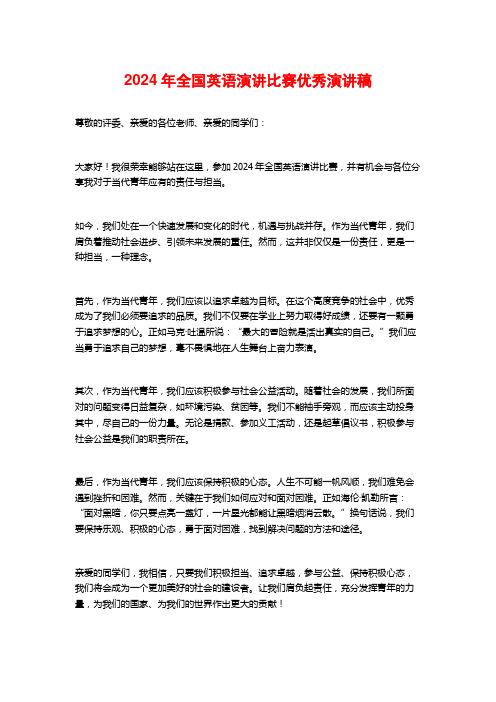
2024年全国英语演讲比赛优秀演讲稿尊敬的评委、亲爱的各位老师、亲爱的同学们:大家好!我很荣幸能够站在这里,参加2024年全国英语演讲比赛,并有机会与各位分享我对于当代青年应有的责任与担当。
如今,我们处在一个快速发展和变化的时代,机遇与挑战并存。
作为当代青年,我们肩负着推动社会进步、引领未来发展的重任。
然而,这并非仅仅是一份责任,更是一种担当,一种理念。
首先,作为当代青年,我们应该以追求卓越为目标。
在这个高度竞争的社会中,优秀成为了我们必须要追求的品质。
我们不仅要在学业上努力取得好成绩,还要有一颗勇于追求梦想的心。
正如马克·吐温所说:“最大的冒险就是活出真实的自己。
”我们应当勇于追求自己的梦想,毫不畏惧地在人生舞台上奋力表演。
其次,作为当代青年,我们应该积极参与社会公益活动。
随着社会的发展,我们所面对的问题变得日益复杂,如环境污染、贫困等。
我们不能袖手旁观,而应该主动投身其中,尽自己的一份力量。
无论是捐款、参加义工活动,还是起草倡议书,积极参与社会公益是我们的职责所在。
最后,作为当代青年,我们应该保持积极的心态。
人生不可能一帆风顺,我们难免会遇到挫折和困难。
然而,关键在于我们如何应对和面对困难。
正如海伦·凯勒所言:“面对黑暗,你只要点亮一盏灯,一片星光都能让黑暗烟消云散。
”换句话说,我们要保持乐观、积极的心态,勇于面对困难,找到解决问题的方法和途径。
亲爱的同学们,我相信,只要我们积极担当、追求卓越,参与公益、保持积极心态,我们将会成为一个更加美好的社会的建设者。
让我们肩负起责任,充分发挥青年的力量,为我们的国家、为我们的世界作出更大的贡献!谢谢大家!。
全国大学生英语演讲比赛演讲稿(优秀9篇)
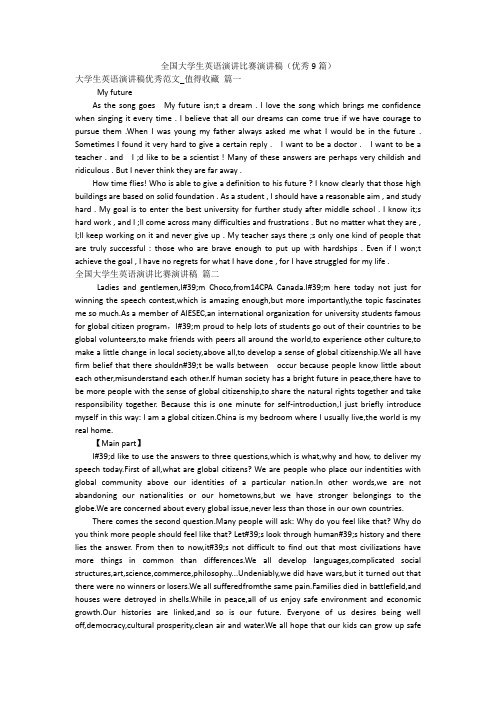
全国大学生英语演讲比赛演讲稿(优秀9篇)大学生英语演讲稿优秀范文_值得收藏篇一My futureAs the song goes My future isn;t a dream . I love the song which brings me confidence when singing it every time . I believe that all our dreams can come true if we have courage to pursue them .When I was young my father always asked me what I would be in the future . Sometimes I found it very hard to give a certain reply . I want to be a doctor . I want to be a teacher . and I ;d like to be a scientist ! Many of these answers are perhaps very childish and ridiculous . But I never think they are far away .How time flies! Who is able to give a definition to his future ? I know clearly that those high buildings are based on solid foundation . As a student , I should have a reasonable aim , and study hard . My goal is to enter the best university for further study after middle school . I know it;s hard work , and I ;ll come across many difficulties and frustrations . But no matter what they are , I;ll keep working on it and never give up . My teacher says there ;s only one kind of people that are truly successful : those who are brave enough to put up with hardships . Even if I won;t achieve the goal , I have no regrets for what I have done , for I have struggled for my life .全国大学生英语演讲比赛演讲稿篇二Ladies and gentlemen,I#39;m Choco,from14CPA Canada.I#39;m here today not just for winning the speech contest,which is amazing enough,but more importantly,the topic fascinates me so much.As a member of AIESEC,an international organization for university students famous for global citizen program,I#39;m proud to help lots of students go out of their countries to be global volunteers,to make friends with peers all around the world,to experience other culture,to make a little change in local society,above all,to develop a sense of global citizenship.We all have firm belief that there shouldn#39;t be walls between occur because people know little about each other,misunderstand each other.If human society has a bright future in peace,there have to be more people with the sense of global citizenship,to share the natural rights together and take responsibility together. Because this is one minute for self-introduction,I just briefly introduce myself in this way: I am a global citizen.China is my bedroom where I usually live,the world is my real home.【Main part】I#39;d like to use the answers to three questions,which is what,why and how, to deliver my speech today.First of all,what are global citizens? We are people who place our indentities with global community above our identities of a particular nation.In other words,we are not abandoning our nationalities or our hometowns,but we have stronger belongings to the globe.We are concerned about every global issue,never less than those in our own countries.There comes the second question.Many people will ask: Why do you feel like that? Why do you think more people should feel like that? Let#39;s look through human#39;s history and there lies the answer. From then to now,it#39;s not difficult to find out that most civilizations have more things in common than differences.We all develop languages,complicated social structures,art,science,commerce,philosophy...Undeniably,we did have wars,but it turned out that there were no winners or losers.We all sufferedfromthe same pain.Families died in battlefield,and houses were detroyed in shells.While in peace,all of us enjoy safe environment and economic growth.Our histories are linked,and so is our future. Everyone of us desires being well off,democracy,cultural prosperity,clean air and water.We all hope that our kids can grow up safeand sound,don#39;t we? Since we share the same feelings,the same hope, humankind is essentially one.If you think that#39;s too big.Let#39;s come down to current globalization is the trendthat no one can stop.Investment comesfromevery corner of the world,and different markets are tightly is needed if everyone wants to live better ,issues of global level are more noticable than before:climate change,financial crisis,women#39;s right,children#39;s health...Without the sense of global citizenship, no one is willing to sit down and settle down the problems together.Now move to the last question: how to become a global citizen? As a saying goes:To see,to understand,then to of my friendin AIESEC went to Karachi,Pakistan this had she thought that she could see a MacDonald restaurant and hear songs of Taylor Swift right after getting off the plane.What she saw was people living their normal life in the so-called City of Death.Adults going to work,students going to school,just like what we#39;re doing here,although a bullet may fly above their heads the next second.She was also impressed by youngsters in Pakistan,who showed courage,faith and confidence to create a bright future for their just panic and depress can survive there as the news reports,but also the seed of hope is sprouting.Another friendof mine in AIESEC isfromIndia.His name is Kunal,and he regards himself as a global citizen.He joined AIESEC in India,where he met his lifelong lover,a blonde Russian girl in a local project.When he went to the university of Copenhagen,he joined the AIESEC committee there as ,he is in Canada, running another AIESEC project called Green Power Now,giving advice to the government about environmental protection.Young people like Kunal are changing the world now,with their experience, ability, ambition and the name of global citizens.My speech is almost finished according to the three questions,but traditionally,speakers have to quote something so today I#39;d like quote a song by John Lennon.The name is Imagine. 大学生英语演讲稿篇三a scene to remembergu qiubeishanghai international studies universityadvisor: gong longshenggood afternoon, ladies and gentlemen. today i would like to begin with a story.there was once a physical 1) therapist who traveled all the way from america to africa to do a 2) census about mountain 3) gorillas. these gorillas are a main attraction to tourists from all over the world; this put them severely under threat of 4) poaching and being put into the zoo. she went there out of curiosity, but what she saw strengthened her determination to devote her whole life to fighting for those beautiful creatures. she witnessed a scene, a scene taking us to a place we never imaged we've ever been, where in the very depth of the african rainforest, surrounded by trees, flowers and butterflies, the mother gorillas 5) cuddled their babies.yes, that's a memorable scene in one of my favorite movies, called gorillas in the mist, based on a true story of mrs. dian fossey, who spent most of bet lifetime in rwanda to protect the ecoenvironment there until the very end of her life.to me, the movie not only presents an unforgettable scene but also acts as a 6) timeless reminder that we should not develop the tourist industry at the cost of our ecoenvironment.today, we live in a world of prosperity but still threatened by so many new problems. on the one hand, tourism, as one of the most promising industries in the 21st century, provides people with the great opportunity to see everything there is to see and to go any place there is to go. it has become a lifestyle for some people, and has turned out to be the driving force in gdp growth.it has the magic to turn a backward town into a wonderland of prosperity. but on the other hand, many problems can occur---natural scenes aren't natural anymore. deforestation to heat lodges is devastating nepal. oil spills from tourist boats are polluting antarctica. tribal people are forsaking their native music and dress to listen to u2 on walkman and wear nike and reeboks.all these 7) appalling(令人震惊的) facts have brought us to the realization that we can no longer stand by and do nothing, because the very thought of it has been 8) eroding(侵蚀) our resources. encouragingly, the explosive growth of global travel has put tourism again in the spotlight, which is why the united nations has made 20xx the year of ecotourism, for the first time to bring to the world's attention the benefits of tourism, but also its capacity to destroy our ecoenvironment.now every year, many local ecoenvironmental protection organizations an: receiving donations--big notes, small notes or even coins--from housewives, 9) plumbers(水管工人), ambulance drivers, salesmen, teachers, children and 10) invalids(残疾人), some of them can not afford to send the money but they do. these are the ones who drive the cabs, who nurse in hospitals, who are suffering from ecological damage in their neighborhood. why? because they care. because they still want their mother nature back. because they know it still belongs to them.this kind of feeling that i have, ladies and gentlemen, is when it feels like it, smells like it, and looks like it, it's all coming from a scene to remember, a scene to recall and to cherish.the other night, as l saw the moon linger over the land and before it was sent into the invisible, my mind was filled with songs. i found myself humming softly, not to the music, but to some- thing else, someplace else. a place remembered, a place untouched, a field of grass where no one seem to have been except the deer.and all those unforgettable scenes strengthened the feeling that it's lime for us to do something, for our own and our coming generation.once again, i have come to think of mrs. dian fossey be- cause it's with her spirit, passion, courage and strong sense of our ecoenvironment that we are taking our next step into the world.and no matter who we are, what we do and where we go, in our mind, there's always a scene to remember, a scene worth our effort to protect it and fight for it.thank you very much.大学生英语2分钟演讲稿篇四I love the school,if say my childhood like a string of shells,then I think the life of the school in the xxx is one of the most beautiful one.I have learned a man I love the school and learned a lot of knowledge,I am here to grow up happily.I love the warmth of the big collective,united as one love it,love its elegant environment,love its rich variety of activities.School students to participate in organized competition,students are encouraged to register; clean up the campus health,we are all hands-on; the establishment of xxx tra-curricular groups,everyone fighting over who gets to participate.So one thing left me with an indelible impression.Also remember that it was New Years party in 20xxx,when Classroom layout looks xxx tremely beautiful! The color bars covered with colorful classroom on the blackboard the words Happy New Year a few characters,the following horses are running in the lovely painted pony,glass puffing Happy New Year message.The General Assembly began,me and Liu Yunpeng as a moderator to tell you solemnly announced: New Years party now!,The students were performing a self-compiled dance,little drama,poetry recitation,heartily xxx press our joy.Applause,laughter break out.We also conducted a lot of interesting games.Suddenly,the dooropened,Zhao Shu Yi Smiling mother holding two bo xxx cake walked.Oh,the cake myself!Everyone cheered xxx citedly. Sub-cake now! Let us cheer -! Liu Yunpeng joyfully waving his hands,said.Suddenly,a wave of cheering audio-visual sea wave after wave.Yu teacher gently lifted cake bo xxx es.Wow,this cake is so beautiful! Green kiwi fruit and orange,pineapple pieces and the bright red Happy Birthday Picture with xxxx ceptionally good-looking.Yu teacher was showing the knife,the cake into pieces and handed us constantly spoke words of blessing.I took the cake was so xxx cited.I know that this cake means that we have entered a new year; we grow up,mature and become more intelligent,and Should be more sensible,more know for others services.At first,we just do not understand what happened to xxx iao Maohai,and now we have become the schools Big Brothers Big Sisters of the.This requires the teachers education is inseparablefromthe cultivation of the school.The sound of this song and laughter,weended the New Year get-together.I saw the smiles of the students are xxx tremely happy heart.Ah,such a collective,so how can I not love it,how can we not feel happy? I love my group,I love my school,because it is full of joy.Here I grow up happily! If you ask me,how kind of your alma mater,I will proudly say to you: It is my hearts paradise!大学生英语演讲稿篇五Good morning , boys and girls. I am guopeng and glad to give you a speech about language learning。
全国大学生英语演讲比赛第一名演讲稿的中文翻译
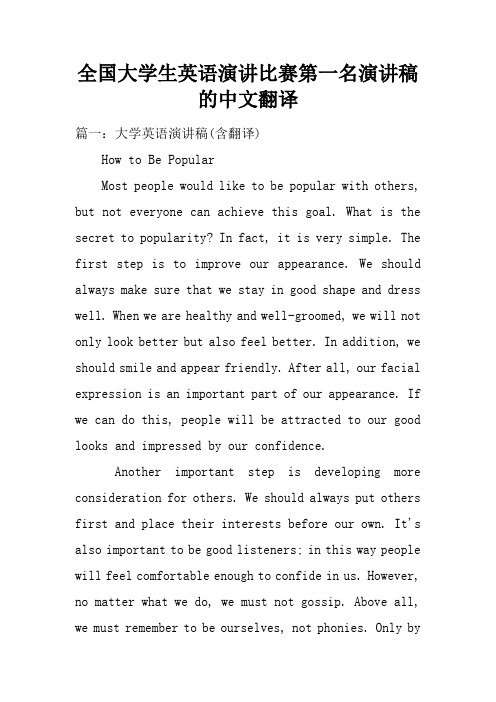
全国大学生英语演讲比赛第一名演讲稿的中文翻译篇一:大学英语演讲稿(含翻译)How to Be PopularMost people would like to be popular with others, but not everyone can achieve this goal. What is the secret to popularity? In fact, it is very simple. The first step is to improve our appearance. We should always make sure that we stay in good shape and dress well. When we are healthy and well-groomed, we will not only look better but also feel better. In addition, we should smile and appear friendly. After all, our facial expression is an important part of our appearance. If we can do this, people will be attracted to our good looks and impressed by our confidence.Another important step is developing more consideration for others. We should always put others first and place their interests before our own. It's also important to be good listeners; in this way people will feel comfortable enough to confide in us. However, no matter what we do, we must not gossip. Above all, we must remember to be ourselves, not phonies. Only bybeing sincere and respectful of others can we earn their respect. If we can do all of the above, I am sure popularity will come our way.如何才能受人欢迎大部分的人都想受人欢迎,但是并非每个人都能达到目标。
第13届21世纪英语演讲比赛冠亚季军演讲稿
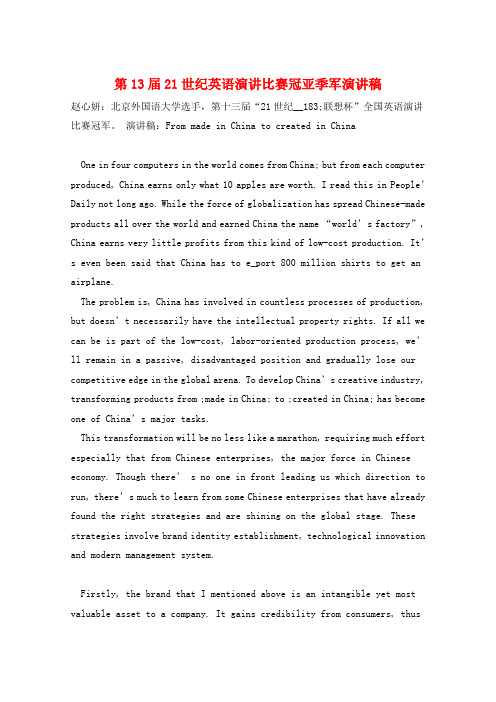
第13届21世纪英语演讲比赛冠亚季军演讲稿赵心妍:北京外国语大学选手,第十三届“21世纪__183;联想杯”全国英语演讲比赛冠军。
演讲稿:From made in China to created in ChinaOne in four computers in the world comes from China; but from each computer produced, China earns only what 10 apples are worth. I read this in People’Daily not long ago. While the force of globalization has spread Chinese-made products all over the world and earned China the name “world’s factory”, China earns very little profits from this kind of low-cost production. It’s even been said that China has to e_port 800 million shirts to get an airplane.The problem is, China has involved in countless processes of production, but doesn’t necessarily have the intellectual property rights. If all we can be is part of the low-cost, labor-oriented production process, we’ll remain in a passive, disadvantaged position and gradually lose our competitive edge in the global arena. To develop China’s creative industry, transforming products from ;made in China; to ;created in China; has become one of China’s major tasks.This transformation will be no less like a marathon, requiring much effort especially that from Chinese enterprises, the major force in Chinese economy. Though there’ s no one in front leading us which direction to run, there’s much to learn from some Chinese enterprises that have already found the right strategies and are shining on the global stage. These strategies involve brand identity establishment, technological innovation and modern management system.Firstly, the brand that I mentioned above is an intangible yet most valuable asset to a company. It gains credibility from consumers, thusconstituting the reason for consumers to buy habitually. Tong Ren Tang, the largest producer of traditional Chinese medicine, remains one of the oldest surviving brand names. The credibility that it gained through quality products has made its name known worldwide and maintains its recognized brand.The second strategy is innovation of technology, which helps enterprises gain its core competency. In the global era where technology emerges at a rapid speed, one has to adopt the latest technology, and also to compete for the speed of developing new ones. The success of Haier, the third largest household appliances manufacturer in the world, lies in its constant innovation. Over the past 16 years, Haier has invested a total of 7 billion RMB in technological development, using 6 percent of its income for scientific research and the development of new products. At present, Haier’s development operational speed is turning out 1.3 new products a day, maintaining its upper-hand in the。
全国大学生英语英语演讲比赛第一名_顾秋蓓演讲稿

全国大学生英语英语演讲比赛第一名顾秋蓓全国大学生英语英语演讲比赛第一名顾秋蓓演讲稿A Scene to RememberGu QiubeiShanghai International Studies UniversityAdvisor: Gong LongshengGood afternoon, ladies and gentlemen. Today I would like to begin with a story.There was once a physical 1) therapist who traveled all the way from America to Africa to do a 2) census about mountain 3) gorillas. These gorillas are a main attraction to tourists from all over the world; this put them severely under threat of 4) poaching and being put into the zoo. She went there out of curiosity, but what she saw strengthened her determination to devote her whole life to fighting for those beautiful creatures. She witnessed a scene, a scene taking us to a place we never imaged we've ever been, where in the very depth of the African rainforest, surrounded by trees, flowers and butterflies, the mother gorillas 5) cuddled their babies.Yes, that's a memorable scene in one of my favorite movies, called Gorillas in the Mist, based on a true story of Mrs. Dian Fossey, who spent most of bet lifetime in Rwanda to protect the ecoenvironment there until the very end of her life.To me, the movie not only presents an unforgettable scene but also acts as a 6) timeless reminder that we should not develop the tourist industry at the cost of our ecoenvironment.Today, we live in a world of prosperity but still threatened by so many new problems. On the one hand, tourism, as one of the most promising industries in the 21st century, provides people with the great opportunity to see everything there is to see and to go any place there is to go. It has become a lifestyle for some people, and has turned out to be the driving force in GDP growth. It has the magic to turn a backward town into a wonderland of prosperity. But on the other hand, many problems can occur---natural scenes aren't natural anymore. Deforestation to heat lodges is devastating Nepal. Oil spills from tourist boats are polluting Antarctica. Tribal people are forsaking their native music and dress to listen to U2 on Walkman and wear Nike and Reeboks.All these 7) appalling(令人震惊的) facts have brought us to the realization that we can no longer stand by and do nothing, because the very thought of it has been 8) eroding(侵蚀) our resources. Encouragingly, the explosive growth of global travel has put tourism again in the spotlight, which is why the UnitedNations has made 2002 the year of ecotourism, for the first time to bring to the world's attention the benefits of tourism, but also its capacity to destroy our ecoenvironment.Now every year, many local ecoenvironmental protection organizations an: receiving donations--big notes, small notes or even coins--from housewives, 9) plumbers(水管工人), ambulance drivers, salesmen, teachers, children and 10) invalids(残疾人), Some of them can not afford to send the money but they do. These are the ones who drive the cabs, who nurse in hospitals, who are suffering from ecological damage in their neighborhood. Why? Because they care. Because they still want their Mother Nature back. Because the y know it still belongs to them.This kind of feeling that I have, ladies and gentlemen, is when it feels like it, smells like it, and looks like it, it's all coming from a scene to remember, a scene to recall and to cherish.The other night, as l saw the moon linger over the land and before it was sent into the invisible, my mind was filled with songs. I found myself humming softly, not to the music, but to some- thing else, someplace else. a place remembered, a place untouched, a field of grass where no one seem to have been except the deer.And all those unforgettable scenes strengthened the feeling that it's lime for us to do something, for our own and our coming generation.Once again, I have come to think of Mrs. Dian Fossey be- cause it's with her spirit, passion, courage and strong sense of our ecoenvironment that we are taking our next step into the world.And no matter who we are, what we do and where we go, in our mind, there's always a scene to remember, a scene worth our effort to protect it and fight for it.Thank you very much.。
英语比赛获奖演讲稿5篇
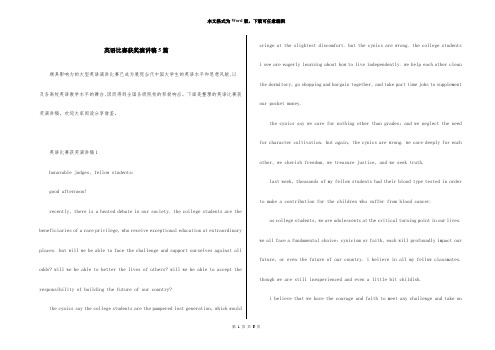
英语比赛获奖演讲稿5篇颇具影响力的大型英语演讲比赛已成为展现当代中国大学生的英语水平和思想风貌,以及各高校英语教学水平的舞台,因而得到全国各级院校的积极响应。
下面是整理的英语比赛获奖演讲稿,欢迎大家阅读分享借鉴。
英语比赛获奖演讲稿1honorable judges, fellow students:good afternoon!recently, there is a heated debate in our society. the college students are the beneficiaries of a rare privilege, who receive exceptional education at extraordinary places. but will we be able to face the challenge and support ourselves against all odds? will we be able to better the lives of others? will we be able to accept the responsibility of building the future of our country?the cynics say the college students are the pampered lost generation, which would cringe at the slightest discomfort. but the cynics are wrong. the college students i see are eagerly learning about how to live independently. we help each other clean the dormitory, go shopping and bargain together, and take part time jobs to supplement our pocket money.the cynics say we care for nothing other than grades; and we neglect the need for character cultivation. but again, the cynics are wrong. we care deeply for each other, we cherish freedom, we treasure justice, and we seek truth.last week, thousands of my fellow students had their blood type tested in order to make a contribution for the children who suffer from blood cancer.as college students, we are adolescents at the critical turning point in our lives. we all face a fundamental choice: cynicism or faith, each will profoundly impact our future, or even the future of our country. i believe in all my fellow classmates. though we are still inexperienced and even a little bit childish.i believe that we have the courage and faith to meet any challenge and take onour responsibilities. we are preparing to assume new responsibilities and tasks, and to use the education we have received to make our world a better place. i believe in our future.英语比赛获奖演讲稿2once upon a time, a weenie ant was walking on his way. as he was walking, suddenly he felt the ground shaking terribly. he looked around with his paranoid eyes and saw an elephant walking right behind him. quickly, the little ant covered himself with dirt, but one leg was unfortunately left out. a sparrow saw everything, so she flew down with the purpose of teasing the ant: “hey, chicken! watch out your leg, it’s out!” the ant felt embarrassed at first but then calmly responded: “ shi…i am going to trip that elephant.”right now, i’m standing on this glamorous stage. but everything here reminds me of is a not so fun memory. around this time last year i was in nanjing competing in another speech contest. that was the first time for me to be in such a large event. of course the pressure i was under was immense too. after a sleepless and stressful night, i went onto that stage without the feeling in my legs. that speech turned out to be horrible. i don’t remember how i get down from there, but i do remember afterwards i just wanted to find a hole to hide in just like the ant in the story. back at my school, it took a long time for me to recover. thanks to all the help i got from my special friends. my confidence was restored. after rounds of giving speeches and answering tough questions, i am here today. from all that i’ve been through i’ve learned that a good future is based on a forgotten past, if i want my life to go on well i have to let go of my past failure. so today, with out fear, i am tripping my elephant again.英语比赛获奖演讲稿3As the song goes “ My future isn’t a dream .” I love the song which brings me confidence when singing it every time . I believe that all our dreams can come true if we have courage to pursue them .When I was young my father always asked mewhat I would be in the future . Sometimes I found it very hard to give a certain reply . “ I want to be a doctor .”“ I want to be a teacher .” and “ I ’d like to be a scientist !” Many of these answers are perhaps very childish and ridiculous . But I never think they are far away .How time flies! Who is able to give a definition to his future ? I know clearly that those high buildings are based on solid foundation . As a student , I should have a reasonable aim , and study hard . My goal is to enter the best university for further study after middle school . I know it’s hard work , and I ’ll come across many difficulties and frustrations . But no matter what they are , I’ll keep working on it and never give up . My teacher says there ’s only one kind of people that are truly successful : those who are brave enough to put up with hardships . Even if I won’t achieve the goal , I have no regrets for what I have done , for I have struggled for my life .英语比赛获奖演讲稿4 I Love You, China!Good morning, ladies and gentlemen, I’m very glad to make a speech here. Today my topic is “I love you, China.”Since the day I was born, I began to have a proud name—Chinese. Since the day I began to talk, the most beautiful sentence I’ve ever learnt has been “I love you, China!”I love you, China, and I’m so proud of being a Chinese. I’m proud that I’ve got the beautiful yellow skin, black eyes and black hair. I’m also proud that I speak the most beautiful language in the world—Chinese.I love you, China, for I can feel the deep love you give me every day, every minute. Last year, I got an opportunity to visit the United States of America. During my staying there, my father’s boss once invited my family to dinner. While at table, he looked at me and asked: “Little boy, how long have you been in America?”“About a month,”I answered, “How lucky you are!” he said, “If you were living in China, how couldyou learn such perfect English?” I smiled and told him proudly that all the students in China are able to learn English at school. I saw his surprised eyes and said to myself, “I’m proud of you, China. For you are offering us the best education.” When I came back from the USA, my friends asked me: “How do you feel about your staying there?”“Wonderful” I said. “Then why do you come back?” Hearing this, I told them there were lots of beautiful countries in the world, but none of them can compare with our own country—China. How true the saying is: “There’s no place like home!”I love you, China. As a young student, all we should do is to study hard and devote ourselves whole-heartedly in the future, to the great cause of building you into an even stronger and greater country in the world. I love you, my dear motherland! I love you, China!Thank you for your listening !英语比赛获奖演讲稿5 On March 14th, 2021, professor Stephen William Hawking passed away. His contribution to inflationary cosmology has forever shifted our understanding of the universe. He wasn’t just a physicist for England, but for all mankind. His death marks the end of an era. He has passed the baton to a new generation of minds, to a new era. The exploration of nature waits for no man. So, are we ready to embrace the new era and new challenges?When I was a kid, professor Hawking was known to me as the author of A Brief History of Time. I bought a lot of science books back then, but they were really difficult to understand. Whenever I stumbled, I would turn to my physics teacher for help. We would go through pages and pages of materials together, whether it was middle school stuff or Feynman’s lecture from Caltech, sometimes hours on end. I felt like we were tearing off the mask of nature and staring at the face of god. It was his guidance that encouraged me to study physics today. We’re living in an era in which science is embedded in people’s lives. From teachers who pass on knowledge, to constructionworkers who build labs; from organizations that provide funding, to scientists who conduct research, we all contribute to science in our own unique ways. We the people say we’re ready.On October 5th, 2021, China finally had its first Nobel Prize in natural science. Ms. Tu Youyou’s work and her receiving the most prestigious science award made us proud. We’re living in an era in which China is building some of the best research projects and institutions worldwide. Just a month ago, Professor Zhang Miman won the UNESCO for Women in Science Award, making her the fifth Chinese recipient of this honor. A week after that, The Economist referred to China as “a continent-sized rapidly growing economy with a culture of scientific inquiry”. Physicist and vice president of the Chinese Academy of Science, Dr. Zhang Jie stated, “China now has the most accurate, sufficient and largest amount of data; China has the highest, fastest and best ability of data analysis. The Chinese government will be strongly pushing for the sharing and utilization of data resources.” We as a country say we’re ready.Science is an immortal topic of mankind. We’ve come this far because we’ve learned to work together and let the ideas evolve. The dispute over the completeness of quantum mechanics, for example, was resolved in the 5th Solvay conference, attended by 29 physicists from 10 different countries who have won 15 Nobel Prizes combined. That was almost 100 years ago. Now we’re living in an era in which information is transmitted at the speed of light, in which “International cooperation” is not just a slogan anymore, especially to the scientific community. Chinese Academy of Science now has 47 partners overseas. The International Council for Science now includes 122 national members, 23 scientific associates and 31 scientific unions. The facilities of the European Organization for Nuclear Research, or CERN, are available to over 600 universities and institutes around the globe. We, the world, are more than ready. We’re all made of particles that have existed since the beginning of the universe, I’d like to believe those particles traveled through countless eras to create us,so that we, the people, China, and the world, can stand on the shoulders of giants, march into the new era with our head held high, and make people like Professor Hawking proud.英语比赛获奖演讲稿。
【2018-2019】第16届21世纪杯全国英语演讲比赛冠军许吉如即兴演讲稿-word范文模板 (8页)
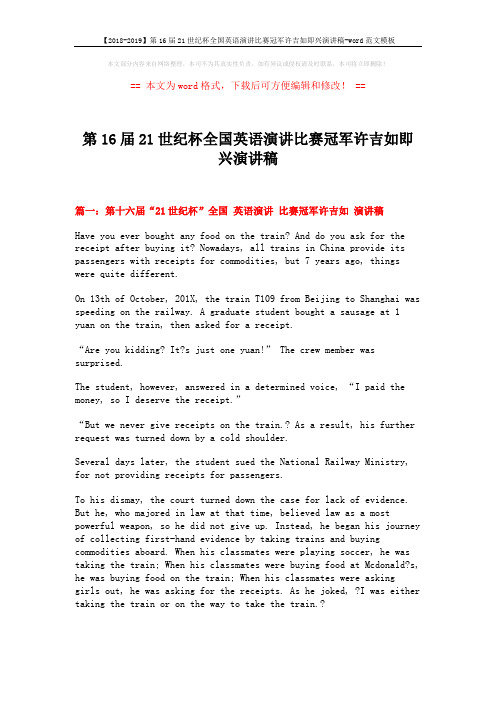
本文部分内容来自网络整理,本司不为其真实性负责,如有异议或侵权请及时联系,本司将立即删除!== 本文为word格式,下载后可方便编辑和修改! ==第16届21世纪杯全国英语演讲比赛冠军许吉如即兴演讲稿篇一:第十六届“21世纪杯”全国英语演讲比赛冠军许吉如演讲稿Have you ever bought any food on the train? And do you ask for the receipt after buying it? Nowadays, all trains in China provide its passengers with receipts for commodities, but 7 years ago, things were quite different.On 13th of October, 201X, the train T109 from Beijing to Shanghai was speeding on the railway. A graduate student bought a sausage at 1 yuan on the train, then asked for a receipt.“Are you kidding? It?s just one yuan!” The crew member was surprised.The student, however, answered in a determined voice, “I paid the money, so I deserve t he receipt.”“But we never give receipts on the train.? As a result, his further request was turned down by a cold shoulder.Several days later, the student sued the National Railway Ministry, for not providing receipts for passengers.To his dismay, the court turned down the case for lack of evidence. But he, who majored in law at that time, believed law as a most powerful weapon, so he did not give up. Instead, he began his journey of collecting first-hand evidence by taking trains and buying commodities aboard. When his classmates were playing soccer, he was taking the train; When his classmates were buying food at Mcdonald?s, he was buying food on the train; When his classmates were askinggirls out, he was asking for the receipts. As he joked, ?I was either taking the train or on the way to take the train.?One month later, he appeared in the court again, with newly-collected evidence and a stronger confidence. And I guess, ladies and gentlemen, you will all cheer for the result because this time, the student won the case. Very soon, a regulation about receipts on the train came out. And whatever we buy on the train now, there?s a receipt for us.Outside the court, the student was asked, “How do you make it to the end?” He said, “As a law student, I roo t my faith in law. I believe that law is there, to protect every person with no exception, and to ensure every person has a say.”His words spread a strong faith in law, which is not only a doctrineof a law student, but also a belief that all citizens ought to hold.It is this faith that initiates the student to resort to law for atiny issue; it is this faith that supports him to endure all the exhausting trips when collecting evidence; It is this faith that makes a seemingly “ridiculous” receipt request legal and rightful.It is this faith that helps to change our life, enhance our judicial system and bring social justice.To many, a receipt of 1 yuan is too small to mention, however rights are to be respected and law is to be believed in. It all starts witha tiny receipt of 1 yuan, but we get a monumental case, a new regulation and a bumper harvest in social justice. The bridge that leads a tiny start to a bumper harvest is faith, the faith in law, rightful and strong.篇二:21世纪杯全国英语演讲比赛冠军演讲稿21世纪杯全国英语演讲比赛冠军演讲稿Facing this audience on the stage, I have the exciting feeling of participating in the march of history, for what we are facing todayis more than a mere competition or contest. It is an assembly of some of China's most talented and motivated people, representatives of a younger generation that are preparing themselves for the coming of a new century.I'm grateful that I've been given this opportunity, at such ahistoric moment, to stand here as a spokesman of my generation and to take a serious look back at the past 15 years, a crucial period for every one of us and for this nation as well.Though it is only within my power to tell about my personal experience, and only a tiny fragment of it at that, it stillrepresents, I believe, the root of a spirit which has been essentialto me and to all the people bred by the past 15 years.In my elementary years, there was a little girl in the class who worked very hard but somehow could never do satisfactorily in her lessons.The teacher asked me to help her, and it was obvious that sheexpected a lot from me. but as a young boy, restless, thoughtless, I always tried to evade her so as to get more time to enjoy myself. One day before the final exam, she came up to me and said, "Couldyou please explain this to me? I want very much to do better this time. " I started explaining, and finished in a hurry. Pretending not to notice her still confused eyes, I ran off quickly. Natsurprisingly, she again did very badly in the exam. And two months later, at the beginning of the new semester, word came of her deathof blood cancer. No one ever knew about the little task I failed to fulfill, but I couldn't forgive myself. I simply couldn't forget her eyes, which seem to be asking, "Why didn't you do a little more to help me, when it was so easy for you? Why didn't you understand alittle better the trust placed in you, so that I would not have to leave this world in such pain and regret?"I was about eight or nine years old at that time, but in a way it was the very starting point of my life, for I began to understand theword "responsibility" and to learn to always do my duties faithfully and devotedly, for the implications of that sacred word has dawned on me: the mutual need and trust of people, the co-operation and inter-reliance which are the very foundation of human society.Later in my life, I continued to experience many failures. But never again did I feel that regret which struck me at the death of the girl, for it makes my heart satisfied to think that I have always done everything in my power to fulfill my responsibilities as best I can.As I grew up, changed and improved by this incident and many other similar ones, I began to perceive the changes taking place around me and to find that society, in a way, was in its formative years like myself. New buildings, new commodities and new fashions appear every day.。
孙宁英语演讲稿
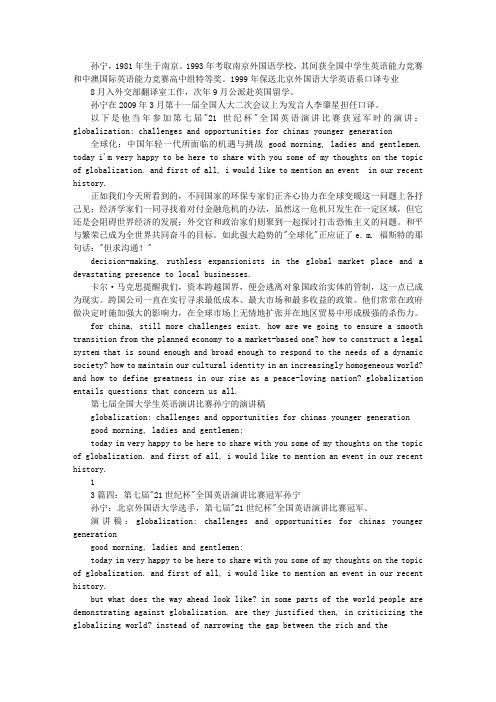
孙宁,1981年生于南京。
1993年考取南京外国语学校,其间获全国中学生英语能力竞赛和中澳国际英语能力竞赛高中组特等奖。
1999年保送北京外国语大学英语系口译专业8月入外交部翻译室工作,次年9月公派赴英国留学。
孙宁在2009年3月第十一届全国人大二次会议上为发言人李肇星担任口译。
以下是他当年参加第七届"21世纪杯"全国英语演讲比赛获冠军时的演讲:globalization: challenges and opportunities for chinas younger generation 全球化:中国年轻一代所面临的机遇与挑战 good morning, ladies and gentlemen.today i'm very happy to be here to share with you some of my thoughts on the topicof globalization. and first of all, i would like to mention an event in our recenthistory.正如我们今天所看到的,不同国家的环保专家们正齐心协力在全球变暖这一问题上各抒己见;经济学家们一同寻找着对付金融危机的办法,虽然这一危机只发生在一定区域,但它还是会阻碍世界经济的发展;外交官和政治家们则聚到一起探讨打击恐怖主义的问题。
和平与繁荣已成为全世界共同奋斗的目标。
如此强大趋势的"全球化"正应证了e. m. 福斯特的那句话:"但求沟通!"decision-making, ruthless expansionists in the global market place and adevastating presence to local businesses.卡尔·马克思提醒我们,资本跨越国界,便会逃离对象国政治实体的管制,这一点已成为现实。
最新第十届“21世纪杯”全国英语演讲比赛冠军(精选多篇)讲话致辞

最新第十届“21世纪杯”全国英语演讲比赛冠军(精选多篇)讲话致辞第十届“21世纪杯”全国英语演讲比赛冠军(精选多篇) 第一篇:第十届“21世纪杯”全国英语演讲比赛冠军演讲稿building bridges for the futurei’m studying in a city that’s famous for its y city are amazed at the imposing sight of its any other cities, and they built the great ies and evil spirits. this tradition has survived to this day: any parks and schools the public.for a long time, ost natural things in the e.my perceptions, hoade a hiking trip to the eastern suburbs of my city. my classmates and i e foreign students. as ed a e, “ed taken aback, “i thought you chinese had ark set off a heated debate. at one point, he likened our any places in china that had no this student. for instance, he told me that some major universities like oxford and cambridge it that any ust look carefully at them and decide e pede our development.let me give another example.a year ago, paper, i needed a book on business lay request to borroeanester, i heard that my university had started to think of unifying its libraries and linking themto libraries at other universities, so my experience any library. any of these intangible ine their role in the modern ine and other cities? should doy city, like beijing and other cities, is actually making a great effort to preserve the any schoolchildren e bridges to our past and to the rest of the bed src=http:///n_v19_/c11_/20_/14_/t3866324_/zhajm_1162616 358_271_/312473_/0_/2902326.sbed>(点击视频中央的箭头,开始播放英语演讲视频) 第十届“21世纪杯”全国英语演讲比赛冠军——夏鹏第三篇:第十届“21世纪杯”全国英语演讲比赛冠军夏鹏演讲稿from studying in a city famous for its y city are amazed by the imposing sight of the city any other cities, and they built the great ies and evil spirits. this tradition has been maintained to this day as any parks and schools the public. i gre since my childhood. for a long time, ost natural things in the y perception, hoy city. my classmates and i e international students. as ed a huge canopy above our heads. suddenly an international student asked me, ed taken aback, i thought you chinese have ark set off a heated debate. at one point, he likened our any places in chinathat had no this international student. for instance, he told me that universities like oxford and cambridge puses it that any ust carefully examine them, e p ede china’s development.let me give you an example.a year ago, paper, i needed a book on business lay request eanester, i heard that my university has started not only to unify its libraries but also link them up y experience , any library. any of these intangible ine their roles in the modern y city and other cities? should doy city, like beijing and other cities, is actually making a great effort to preserve the any schoolchildren trying to study our history and cultural heritage. studying in a city famous for its y city are amazed by the imposing sight of the city any other cities, and they built the great ies and evil spirits. this tradition has been maintained to this day as any parks and schools the public. i gre since my childhood. for a long time, ost natural things in the y perception, hoy city. my classmates and i e international students. as ed a huge canopy above our heads. suddenly an international student asked me, ed taken aback, i thought you chinese have ark set off a heated debate. at onepoint,he likened our any places in china that had no this international student. for instance, he told me that universities like oxford and cambridge puses it that any ust carefully examine them, e pede china’s development. let me give you an example.a year ago, paper, i needed a book on business lay request eanester, i heard that my university has started not only to unify its libraries but also link them up y experience , any library. any of these intangible ine their roles in the modern y city and other cities? should doy city, like beijing and other cities, is actually making a great effort to preserve the any schoolchildren trying to study our history and cultural heritage. studying in a city famous for its y city are amazed by the imposing sight of the city any other cities, and they built the great ies and evil spirits. this tradition has been maintained to this day as any parks and schools the public. i gre since my childhood. for a long time, ost natural things in the )rld.my perception, hoy city. my classmates and i e international students. as ed a huge canopy above our heads.suddenly an international student asked me, ed taken aback, i thought you chinese have ark set off a heated debate. at one point, he likened our any places in china that had no this international student. for instance, he told me that universities like oxford and cambridge puses it that any ust carefully examine them, e pede china’s development. let me give you an example.a year ago, paper, i needed a book on business lay request eanester, i heard that my university has started not only to unify its libraries but also link them up y experience , any library. any of these intangible ine their roles in the modern y city and other cities? should doy city, like beijing and other cities, is actuallymaking a great effort to preserve the any schoolchildren trying to study our history and cultural heritage. walls have turned into bridges to our past and to the rest of the world. if the ancient builders of these walls were still alive today, they would be proud to see such great change in the role of their walls. they are now bridges that link east and west, south and north, and all countries of the world. our cultural heritage will survive globalization.--------------------------------------------------------------------------------。
2024年“21世纪杯”全国英语演讲比赛冠军演讲稿
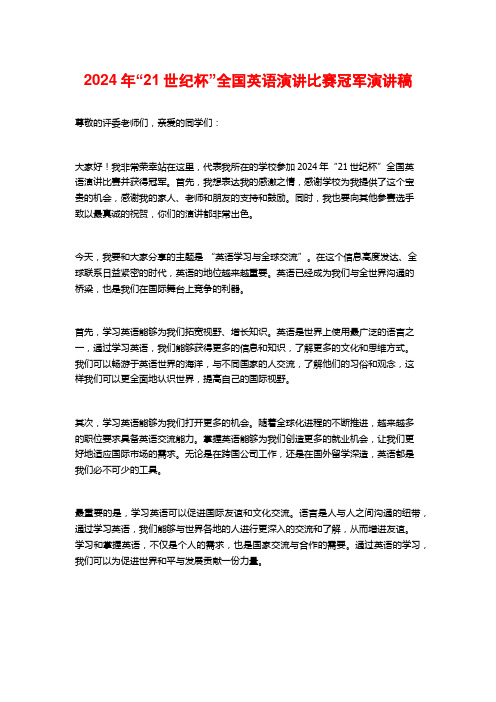
2024年“21世纪杯”全国英语演讲比赛冠军演讲稿尊敬的评委老师们,亲爱的同学们:大家好!我非常荣幸站在这里,代表我所在的学校参加2024年“21世纪杯”全国英语演讲比赛并获得冠军。
首先,我想表达我的感激之情,感谢学校为我提供了这个宝贵的机会,感谢我的家人、老师和朋友的支持和鼓励。
同时,我也要向其他参赛选手致以最真诚的祝贺,你们的演讲都非常出色。
今天,我要和大家分享的主题是“英语学习与全球交流”。
在这个信息高度发达、全球联系日益紧密的时代,英语的地位越来越重要。
英语已经成为我们与全世界沟通的桥梁,也是我们在国际舞台上竞争的利器。
首先,学习英语能够为我们拓宽视野、增长知识。
英语是世界上使用最广泛的语言之一,通过学习英语,我们能够获得更多的信息和知识,了解更多的文化和思维方式。
我们可以畅游于英语世界的海洋,与不同国家的人交流,了解他们的习俗和观念,这样我们可以更全面地认识世界,提高自己的国际视野。
其次,学习英语能够为我们打开更多的机会。
随着全球化进程的不断推进,越来越多的职位要求具备英语交流能力。
掌握英语能够为我们创造更多的就业机会,让我们更好地适应国际市场的需求。
无论是在跨国公司工作,还是在国外留学深造,英语都是我们必不可少的工具。
最重要的是,学习英语可以促进国际友谊和文化交流。
语言是人与人之间沟通的纽带,通过学习英语,我们能够与世界各地的人进行更深入的交流和了解,从而增进友谊。
学习和掌握英语,不仅是个人的需求,也是国家交流与合作的需要。
通过英语的学习,我们可以为促进世界和平与发展贡献一份力量。
然而,学习英语并不是一条易行的路。
面对课业繁重和学习压力,我们可能感到困惑和沮丧。
但是,我想告诉大家,只要我们有信心,有毅力,就一定能够克服困难,取得成功。
首先,我们应该树立正确的学习态度。
学习英语是一个长期的过程,我们必须保持耐心和坚持的精神,不怕困难,不怕挫折。
我们要相信自己的能力,相信只要努力,就一定能够学好英语。
全国英语演讲比赛决赛—崔笑笑,演讲稿
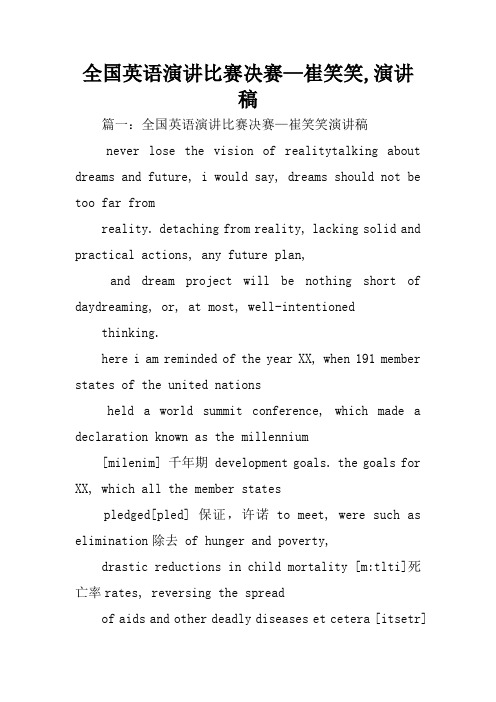
全国英语演讲比赛决赛—崔笑笑,演讲稿篇一:全国英语演讲比赛决赛—崔笑笑演讲稿never lose the vision of realitytalking about dreams and future, i would say, dreams should not be too far fromreality. detaching from reality, lacking solid and practical actions, any future plan,and dream project will be nothing short of daydreaming, or, at most, well-intentionedthinking.here i am reminded of the year XX, when 191 member states of the united nationsheld a world summit conference, which made a declaration known as the millennium[milenim] 千年期 development goals. the goals for XX, which all the member statespledged[pled] 保证,许诺to meet, were such as elimination除去 of hunger and poverty,drastic reductions in child mortality [m:tlti]死亡率rates, reversing the spreadof aids and other deadly diseases et cetera [itsetr]等等。
answer is also no, and indeed is spreading faster and wider than ever is even worse, in the wake of the iraqi[ira:ki]伊拉克的 war, there is thenuclear crisis in iran[irɑ:n], and unsettled situation in many places. the visionof us young people may be limited, but the limited vision we do have and care abouteveryday cannot change our conviction[knvikn]定罪 that our world does not seemto promise a very bright future before us. who is to blame for all this of course we can blame the governments: howdisappointing they all seem to be: in one moment they are pledging to build a betterfuture for people, and in another moment, they ignite[iɡnait]点燃 wars killing moreinnocent people. but don’t you think that we ordinary folks should also take someresponsibilities for, say, elimination[i,liminein] of poverty when we quicklyrush to schools, work places, or places of entertainment, how many times do we stopto hand over some food to thedeprived[dipraivd] 缺少食物的;缺乏足够教育的 on the streets when we are browsing the newspaper for the news about what is going in this world, how often dowe stop to think about the actual ways we can help the people who are suffering fromvarious[vεris] disastrous[dizɑ:strs] situations in fact how much have wedone to help those who are in need just around usnever lose the vision of reality talking about dreams and future, i would say, dreams should not be too far fromreality.detaching from reality, lacking solid and practical actions, any future plan,and dream project will be nothing short of daydreaming, or, at most, well-intentionedthinking.here i am reminded of the year XX, when 191 member states of the united nationsheld a world summit conference, which made a declaration known as the millenniumdevelopment goals. the goals for XX, which all the member states pledged to meet,were such as elimination of hunger and poverty, drastic reductions in child mortalityrates, reversing the spread of aids and other deadly diseasesetc what is even worse, in the wake of the iraqi war, there is the nuclear crisisin iran, and unsettled situation in many places. the vision of us young people maybe limited, but the limited vision we do have and care about everyday cannot changeour conviction that our world does not seem to promise a very bright future beforeus.who is to blame for all this of course we can blame the governments: howdisappointing they all seem to be: in one moment they are pledging to build a betterfuture for people, and in another moment, they ignite wars killing more innocentpeople. but don’t you think that we ordinary folks should also take someresponsibilities for, say, elimination of poverty when we quickly rush to schools,work places, or places of entertainment, how many times do we stop to hand over somefood to the deprived on the streets when we are browsing the newspaper for the newsabout what is going in this world, how often do we stop to think about the actualways we can help the people who are suffering from various disastrous situations in fact how much have we done to help those who are in need just around usdreams are certainly beautiful and indispensable to our life, for they give usinspiration andnever lose the vision of reality good afternoon 这是来自第六名北京语言大学的英语专业的崔笑笑的演讲稿,这篇演讲稿被她演绎的淋漓精致,极为流畅自然,所以她获得了此次大赛的最佳风度奖。
第9届21世纪英语演讲比赛冠亚季军演讲稿
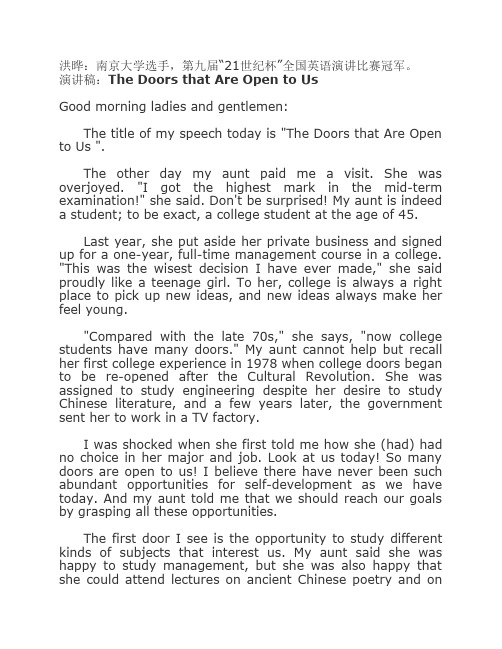
洪晔:南京大学选手,第九届“21世纪杯”全国英语演讲比赛冠军。
演讲稿:The Doors that Are Open to UsGood morning ladies and gentlemen: The title of my speech today is "The Doors that Are Open to Us ". The other day my aunt paid me a visit. She was overjoyed. "I got the highest mark in the mid-term examination!" she said. Don't be surprised! My aunt is indeed a student; to be exact, a college student at the age of 45. Last year, she put aside her private business and signed up for a one-year, full-time management course in a college. "This was the wisest decision I have ever made," she said proudly like a teenage girl. To her, college is always a right place to pick up new ideas, and new ideas always make her feel young. "Compared with the late 70s," she says, "now college students have many doors." My aunt cannot help but recall her first college experience in 1978 when college doors began to be re-opened after the Cultural Revolution. She was assigned to study engineering despite her desire to study Chinese literature, and a few years later, the government sent her to work in a TV factory. I was shocked when she first told me how she (had) had no choice in her major and job. Look at us today! So many doors are open to us! I believe there have never been such abundant opportunities for self-development as we have today. And my aunt told me that we should reach our goals by grasping all these opportunities. The first door I see is the opportunity to study different kinds of subjects that interest us. My aunt said she was happy to study management, but she was also happy that she could attend lectures on ancient Chinese poetry and onShakespearean drama. As for myself, I am an English major, but I may also go to lectures on history. To me, if college education in the past emphasized specialization, now, it emphasizes free and well-rounded development of each individual. So all the fine achievements of human civilization are open to us. The second door is the door to the outside world. Learning goes beyond classrooms and national boundaries. My aunt remembers her previous college days as monotonous and even calls her generation "frogs in a well." But today, as the world becomes a global village, it is important that our neighbors and we be open-minded to learn with and from each other. I have many fellow international classmates, and I am applying to an exchange program with a university abroad. As for my aunt, she is planning to get an MBA degree in the United Kingdom where her daughter, my cousin, is now doing her master's degree in biochemistry. We are now taking the opportunity to study overseas, and when we come back, we'll put to use what we have learnt abroad. The third door is the door to lifelong learning. As new ideas appear all the time, we always need to acquire new knowledge, regardless of our age. Naturally, my aunt herself is the best example. Many of my aunt's contemporaries say that she is amazingly up-to-date for a middle-aged woman. She simply responds, "Age doesn't matter. What matters is your attitude. You may think it's strange that I am still going to college, but I don't think I'm too old to learn." Yes, she is right. Since the government removed the age limit for college admissions in 2001, there are already some untraditional students, sitting with us in the same classrooms. Like these people, my aunt is old but she is very young in spirit. With her incredible energy and determination, she embodies both tradition and modernity. The doors open to us also pose challenges. For instance, we are faced with the challenge of a balanced learning, thechallenge of preserving our fine tradition while learning from the West, and the challenge of learning continuously while carrying heavy responsibilities to our work and family. So, each door is a test of our courage, ability and judgment, but with the support of my teachers, parents, friends and my aunt, I believe I can meet the challenge head on. When I reach my aunt's age, I can be proud to say that I have walked through dozens of doors and will, in the remainder of my life, walk through many more. Possibly I will go back to college, too. Thank you very much, ladies and gentlemen.魏香君:复旦大学选手,第九届“21世纪杯”全国英语演讲比赛亚军。
21世纪杯全国中学生英语演讲比赛高中组全国一等奖演讲稿

good morning,judges, teachers and follow students. today i would like to share withyou my great wish. but first, please allow me to take you back in time to the year1955, the setting, montgomery?ntg?m?ri , alabamhe united states of america. itstarted out as an ordinary december afternoon. 42 year-old african american rosa parksboardeb?:did] a bus and sat down in the front row. she thought over, the days andfriends, her child at home, and how she enjoyed her simple life. she was content,but when she thought about the prejudice and discrimination that she had to faceeveryday, she felt a mends pain. how she wished to live in the world of true harmony“ehen, ehen(咳嗽声)”, rosa was startle to see a white man standing beside her. hewas starring at her coldly, but she managed to smile and ask politely “may i help you sir?”“get out of the seat!” the man snarled back. “excuse me?” rosa was shocked. what right did the man have to speak to her in such a cruel tone? just becauseher skin was dark colored and his was fair. and as equals, he certainly didnt haveany right to order her out of the seat, or did he? well, surprisingly, in 1955, lotslike rosa parks did not have as many rights as whites. due to racial discrimination,rosa’s refusal to give up her seat to a white man, led to a call to the police,and she was arrested jailed and convictea violatinsegregatiolaws. but rosa did not surrender to prejudice,instead she chose to fight discrimination and work alongside thousands of others forher wish to rid the world of racism let us not judge others by their skin color or appearance:[?pir?ns], but ratherby their content of their characte let us learn to enjoy different cultures and thenwe’ll enjoy a world of diversity. i wish to look around on a lonely day, and seea blending of colors. harmony, traveling among people of all skin colors.篇二:21世纪杯”全国英语演讲比赛演讲稿目录第三届“21世纪杯”全国英语演讲比赛冠军——梁励敏 (2)第三届“21世纪杯”全国英语演讲比赛亚军——芮成钢 (5)第四届“21世纪杯”全国英语演讲比赛冠军——蔡力 (9)第六届“21世纪杯”全国英语演讲比赛冠军——戚悦 (11)第七届“21世纪杯”全国英语演讲比赛冠军——孙宁 (13)第八届“21世纪杯”全国英语演讲比赛冠军——顾秋蓓 (17)第九届“21世纪杯”全国英语演讲比赛冠军——洪晔 (20)第十届“21世纪杯”全国英语演讲比赛冠军——夏鹏 (22)第一章寻访记忆引子美丽的女主播,刘欣思维的游戏梁励敏演讲就要言之有物芮成钢is there a short cut?孙宁be yourself 顾秋蓓无一不可入演讲洪晔平谈中透着哀伤夏鹏第二章昨日重现(原声)第一届央视《环球了望》选段刘欣第二届穿洋越海梁励敏第三届东西方相聚芮成钢第四届我们和黄河一道成长蔡力第六届新北京,三色新奥运戚悦第七届全球化:中国年轻一代所面临的挑战与机遇孙宁第八届难忘的一幕顾秋蓓第九届机会之门就在前方洪晔第十届城墙与桥梁夏鹏第三章明灯导航“21世纪杯”英语演讲的艺术史蒂芬·卢卡斯第三只眼看演讲吴杏莲附录“21世纪杯”全国英语演讲比赛和流程简介历届比赛一览第三届“21世纪杯”全国英语演讲比赛冠军——梁励敏梁励敏北京外国语大学梁励敏,生于浙江杭州,毕业于北京外国语大学,获英语语言文学硕士学位,研究生期间专攻方向为美国社会研究。
第十四届21世纪杯全国英语演讲比赛冠军演讲稿
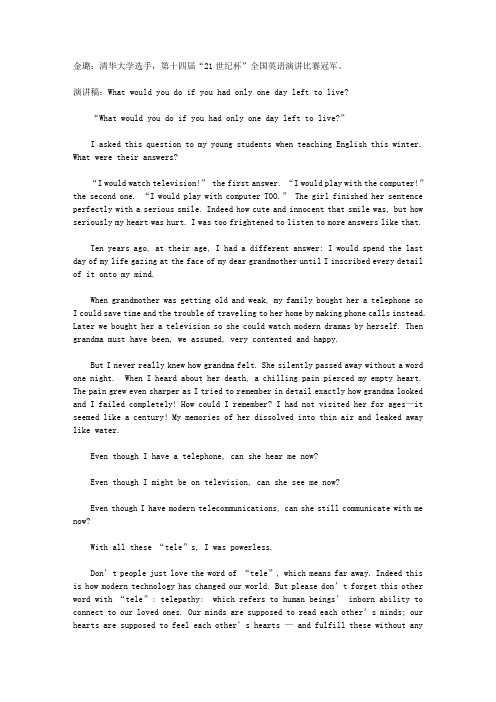
金璐:清华大学选手,第十四届“21世纪杯”全国英语演讲比赛冠军。
演讲稿:What would you do if you had only one day left to live?“What would you do if you had only one day left to live?”I asked this question to my young students when teaching English this winter. What were their answers?“I would watch television!” the first answer. “I would play with the computer!”the second one. “I would play with computer TOO.” The girl finished her sentence perfectly with a serious smile. Indeed how cute and innocent that smile was, but how seriously my heart was hurt. I was too frightened to listen to more answers like that.Ten years ago, at their age, I had a different answer: I would spend the last day of my life gazing at the face of my dear grandmother until I inscribed every detail of it onto my mind.When grandmother was getting old and weak, my family bought her a telephone so I could save time and the trouble of traveling to her home by making phone calls instead. Later we bought her a television so she could watch modern dramas by herself. Then grandma must have been, we assumed, very contented and happy.But I never really knew how grandma felt. She silently passed away without a word one night. When I heard about her death, a chilling pain pierced my empty heart. The pain grew even sharper as I tried to remember in detail exactly how grandma looked and I failed completely! How could I remember? I had not visited her for ages—it seemed like a century! My memories of her dissolved into thin air and leaked away like water.Even though I have a telephone, can she hear me now?Even though I might be on television, can she see me now?Even though I have modern telecommunications, can she still communicate with me now?With all these “tele”s, I was powerless.Don’t people just love the word of “tele”, which means far away. Indeed this is how modern technology has changed our world. But please don’t forget this other word with “tele”: telepathy: which refers to human beings’ inborn ability to connect to our loved ones. Our minds are supposed to read each other’s minds; our hearts are supposed to feel each other’s hearts — and fulfill these without anyforms of tool!But the moment I desperately struggled to remember grandmother’s face, the telepathy between her and me had shut down forever. With the help of modern technology, I killed our telepathy.This shall never happen again! The “tele”s are great inventions. But “telepathy”gives them the warmth of a human face. Let’s harness the power of television to excite our kids to develop their telepathy with nature… so that they can read the secret language of flowers. Let’s make the telephone lines provoke us to preserve our telepathy with each other, so we can connect in a warm and feeling way. Let technology keep our “telepathy” ALIVE! We need to wake up and make this happen.I told my grandma’s story to those young kids that day. They got very quiet. They asked me for a second chance to answer the question. They had come to a new understanding – that very moment they had made to me and to our future together, a dear promise.Thank you very much!。
英语演讲比赛演讲稿范文14篇
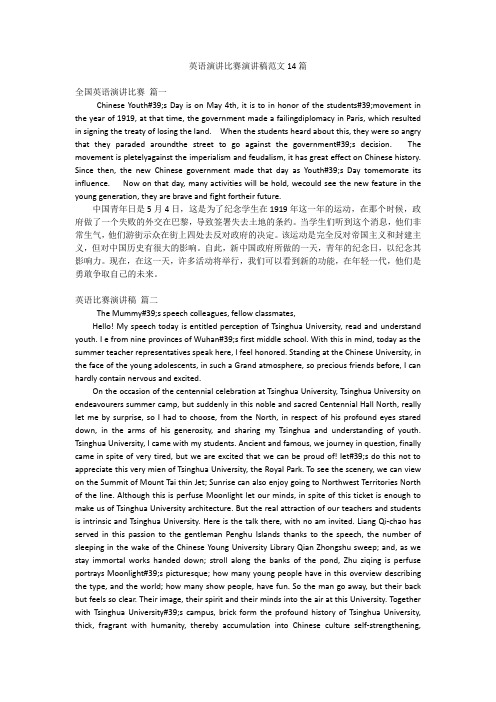
英语演讲比赛演讲稿范文14篇全国英语演讲比赛篇一Chinese Youth#39;s Day is on May 4th, it is to in honor of the students#39;movement in the year of 1919, at that time, the government made a failingdiplomacy in Paris, which resulted in signing the treaty of losing the land.When the students heard about this, they were so angry that they paraded aroundthe street to go against the government#39;s decision.The movement is pletelyagainst the imperialism and feudalism, it has great effect on Chinese history. Since then, the new Chinese government made that day as Youth#39;s Day tomemorate its influence.Now on that day, many activities will be hold, wecould see the new feature in the young generation, they are brave and fight fortheir future.中国青年日是5月4日,这是为了纪念学生在1919年这一年的运动,在那个时候,政府做了一个失败的外交在巴黎,导致签署失去土地的条约。
当学生们听到这个消息,他们非常生气,他们游街示众在街上四处去反对政府的决定。
- 1、下载文档前请自行甄别文档内容的完整性,平台不提供额外的编辑、内容补充、找答案等附加服务。
- 2、"仅部分预览"的文档,不可在线预览部分如存在完整性等问题,可反馈申请退款(可完整预览的文档不适用该条件!)。
- 3、如文档侵犯您的权益,请联系客服反馈,我们会尽快为您处理(人工客服工作时间:9:00-18:30)。
全国英语演讲比赛冠军演讲稿
Building Bridges for the Future
I’m studying in a city that’s famous for its walls。
People who visit my city are amazed at the imposing sight of its walls,especially when silhouetted against the setting sun with gold,shining streaks。
The old, cracked bricks are covered with lichens and the walls are weather-beaten guards standing still for centuries。
Our ancestors liked to build walls。
They built walls in Beijing, Xi’an, Nanjing and many other cities, and they built the Great Wall, which snakes across half our country。
They built walls to protect against enemies and evil spirits。
This tradition has survived to this day: we still have many parks and schools walled off from the public。
For a long time, walls were one of the most natural things in the world to me。
My perceptions, however, changed after I made a hiking trip to the eastern suburbs of my city。
My classmates and I were walking with some foreign students。
As we walked out of the city, we found ourselves flanked by tall trees, which formed a wide canopy above our heads。
Suddenly one foreign
student asked me,“Where is the entrance to the eastern suburbs?”
“We’re already in the eastern suburbs,” I replied。
He seemed taken aback,“I thought you Chinese had walls for everything。
” His remark set off a heated debate。
At one point,he likened our walled cities to “jails”, while I insisted that the eastern suburbs were one of the many places in China that had no walls。
That debate had no winners, but I did learn a lot from this student。
For instance, he told me that some major universities like Oxford and Cambridge were not surrounded by walls。
I have to admit that we do have many walls in China, and as we develop our country, we must look carefully at them and decide whether they are physical or intangible。
We will keep some walls but tear down those that impede our development。
Let me give another example。
A year ago, when I was working on a term paper, I needed a book on business law and found a copy in the law school library。
However, the librarian coldly rejected my request to borrow it, saying,“You can’t borrow this book, you’re not a student here。
” In the end, I had to spend 200 yuan to buy a copy。
Meanwhile, the copy in the law school gathered dust on the shelf。
At the beginning of this semester, I heard that my university had started to think of unifying its libraries and linking them to libraries at other universities, so my experience wouldn’t be repeated。
Barriers would be replaced by bridges。
An inter-library loan system would give us access to books from any library。
With globalization and China integrated into the world, I believe many of these intangible walls will be knocked down。
I know that globalization is a controversial issue, and it is hard to say whether it is good or bad。
But one thing is for sure: it draws our attention to China’s tangible and intangible walls and forces us to examine their role in the modern world。
And how about the ancient walls of mine and other cities? Should we tear them down? Definitely not。
My city, like Beijing and other cities, is actually XXX a great effort to preserve the walls。
These walls attract historians, archaeologists,and many schoolchildren who are trying to study our history and cultural heritage。
Walls have become bridges to our past and to the rest of the world。
If the ancient builders of these walls were still alive today, they would be proud to see such great changes in the role of their walls。
They are now bridges that
link East and West, South and North, and all countries of the world。
Our cultural heritage will survive globalization。
---来源网络整理,仅供参考。
